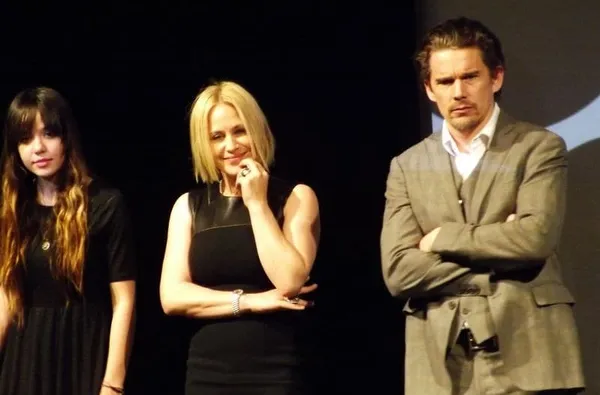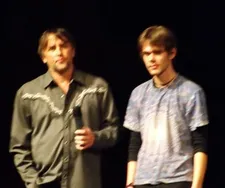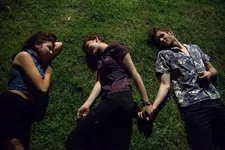 |
| Lorelei Linklater, Patricia Arquette, Ethan Hawke at the premiere of Boyhood at Sundance Film Festival Photo: Amber Wilkinson |
After the premiere, Richard and Lorelei Linklater, Ethan Hawke, Patricia Arquette and Ellar Coltrane talked about the project with the audience.
Speaking about his initial motivations, Linklater said: "I wanted to do something about childhood and I sat down to write. But I couldn't pick one moment - obviously, the limitations of film, you have to pick your moment. And that wasn't good enough - I didn't really have enough to say about one moment. I got this eureka moment of why couldn't you just film a little bit and encompass all of it. So that was the idea, it just hit me - pow! It's so simple actually, in a storytelling way but the practicality of how you make a movie like that, that becomes the difficult part, so I'm just lucky."
 |
| Richard Linklater and Ellar Coltrane at the premiere of Boyhood at Sundance Film Festival 2014. Photo: Amber Wilkinson |
"We had a year to think about it and then it was a very intense three or four-day shoot generally. At the end of the day, we shot for 39 days total, had 143 scenes, it's pretty weird... everything about this film was weird."
Coltrane - who turns into a fine young actor through the course of the film - spoke about how it was growing up with the role. He said: "I would say around 12 or 13, it began to gradually dawn on me what was actually happening. At 7, 12 years is almost twice my life, so it's almost impossible to fathom how long actually that is. But there is a specific point that I remember that I started to grasp the scope of the project and change a lot at that point."
Joking, Linklater added: "Somewhere around year three, Lorelei came to me and asked me, 'Can my character, like, die.' It is difficult to hold a nine-year-old to a 12-year contract."
And what about that title?
Linklater said: "Boyhood - that name ended up on our callsheet and it just became the title. Good titles come early or not at all, so that's our title for better or worse."
The end result is a touching and in-depth meditation on childhood that justiifies every minute of its 164-minute runtime.
Employing a similar experimental technique, though in a more formal fashion and with a considerably truncated timescale is Australian film 52 Tuesdays, which was shot by Sophie Hyde and her crew over the course of a year and only on Tuesdays. The film charts the relationship between an adolescent girl and her lesbian mother who decides to undergo gender transition. I spoke to DoP Bryan Mason about the project when they were planning it (read that here) - but as with most films, the end result is considerably different.
The focus, perhaps surprisingly, falls more on the younger half of the relationship as Billie (newcomer Tilda Cobham-Hervey, of whom we are surely going to hear more), makes her own transition of sexual awakening at the same time as trying to come to terms with only seeing her mum (Del Herbert-Jane, a non-gender conforming individual who was originally the diversity expert on the project) once a week as she undergoes her gender transition treatment. Because the film was shot weekly - a choice marked out by intertitles - you can see Billie physically changing as the months wear on. Meanwhile, the psychological impact of the secrets mother and daughter keep from one another also begin to take their toll. The film gathers considerable momentum through the runtime, although the forced constraints of weekly shooting give it a slightly choppy feel in places. This is a sensitive portrayal of an emotional journey that shows how fluid sexuality can be. Viewers who feel like sharing a little bit of their own experience, can visit My52tuesdays to answer weekly questions about their life. We'll be chatting to Hyde about the film when it goes to the Berlin Film Festival in February and will bring you the interview in full then.
 |
| 52 Tuesdays Photo: Visit Films |





















